|
|
|
Sort Order |
|
|
|
Items / Page
|
|
|
|
|
|
|
| Srl | Item |
| 1 |
ID:
120360
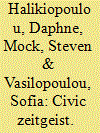

|
|
|
|
|
| Publication |
2013.
|
| Summary/Abstract |
This article examines the relationship between nationalism and liberal values and, more specifically, the redefinition of boundaries between national communities and others in the rhetoric of radical right parties in Europe. The aim is to examine the tension between radical right party discourse and the increasing need to shape this discourse in liberal terms. We argue that the radical right parties that successfully operate within the democratic system tend to be those best able to tailor their discourse to the liberal and civic characteristics of national identity so as to present themselves and their ideologies as the true authentic defenders of the nation's unique reputation for democracy, diversity and tolerance. Comparing the success of a number of European radical right parties ranging from the most electorally successful Swiss People's Party, the Dutch Pim Fortuyn List and Party for Freedom to the more mixed French Front National, British National Party and National Democratic Party of Germany we show that the parties that effectively deploy the symbolic resources of national identity through a predominantly voluntaristic prism tend to be the ones that fare better within their respective political systems. In doing so, we challenge the conventional view in the study of nationalism that expects civic values to shield countries from radicalism and extremism.
|
|
|
|
|
|
|
|
|
|
|
|
|
|
|
|
| 2 |
ID:
127846
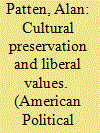

|
|
|
|
|
| Publication |
2013.
|
| Summary/Abstract |
William James Booth elaborates three main challenges to my social lineage account (Patten 2011). Conceptually, he finds the proposal to be question-beginning. Normatively, he thinks that it has objectionable implications. And, substantively, he claims that the proposal is unhelpful, in that it fails to explain a case of theoretical importance for multiculturalism. In this reply, I argue that each of these challenges misses the target. The social lineage account continues to offer a promising, nonessentialist basis for normative multiculturalism.
|
|
|
|
|
|
|
|
|
|
|
|
|
|
|
|
| 3 |
ID:
133712
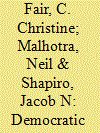

|
|
|
|
|
| Publication |
2014.
|
| Summary/Abstract |
A long-standing research tradition on political culture argues that greater support for core liberal values leads to a rejection of destructive political activities and reduced support for violent politics. In this vein, many contemporary analysts of security policy contend that a lack of democratic values in the Middle East promotes the development of violent political organizations. Unfortunately, there have been few direct tests of the hypothesis that an individual's rejection of democratic values correlates with support for militant groups. We conduct such a test in Pakistan using an original 6,000-person provincially representative survey. We find that strong supporters of democratic values are actually more supportive of militant groups and that this relationship is strongest among those who believe that Muslim rights and sovereignty are being violated in Kashmir. This is consistent with the context of Pakistani politics, where many militant groups use the principle of azadi (i.e., freedom and self-determination) to justify their actions. These results challenge the conventional wisdom about the roots of militancy and underscore the importance of understanding how local context mediates the influence of civic culture on political stability and violence.
|
|
|
|
|
|
|
|
|
|
|
|
|
|
|
|
| 4 |
ID:
113111
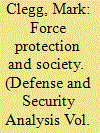

|
|
|
|
|
| Publication |
2012.
|
| Summary/Abstract |
Wars have long been fought with a firm focus upon armies' domestic contexts. These socio-political foundations have underpinned decisions regarding embarking upon war as well the conduct of war itself. Of particular importance among liberal democracies is the emphasis which is now placed upon force protection; broadly conceived as the range of measures employed to ensure the protection of servicemen and women on operations. Decisions surrounding protective equipment, deployed locations and wartime activities all face detailed scrutiny in contemporary operating environments. The attitudes of the government, the military and the civilian population combine to create a complex and dynamic backdrop of harmony and tension to this most sensitive characteristic of modern wars.
|
|
|
|
|
|
|
|
|
|
|
|
|
|
|
|
| 5 |
ID:
098462
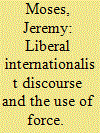

|
|
|
|
|
| Publication |
2010.
|
| Summary/Abstract |
This article analyses the liberal internationalist discourses that drew together the foreign policies of Tony Blair and George W. Bush. While it is clear that the two former leaders maintained a deep and abiding commitment to the spread of freedom and democracy to all corners of the world, very little work has been carried out to explain how these shared values related to their exercise of an aggressive foreign policy and, perhaps more importantly, what this can tell us about some of the most persistent undercurrents of liberal foreign policy practice. This article begins by illustrating the 'liberalisms' of both Blair and Bush before examining the place of globalisation, humanitarianism and democracy in their respective foreign policy doctrines. It then briefly examines whether these themes may continue under the Obama presidency. Finally, the international and domestic consequences of this form of liberal internationalism are raised. The article concludes with the claim that a failure to recognise and understand the inevitable violence generated in pursuit of unquestioned liberal values will lead those who follow Bush and Blair toward the same excessive use of force that has characterised the war on terror.
|
|
|
|
|
|
|
|
|
|
|
|
|
|
|
|
| 6 |
ID:
158391
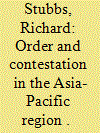

|
|
|
|
|
| Summary/Abstract |
The United States/European-inspired liberal international order has long been challenged in the Asia-Pacific. During the Cold War years, Washington sponsored a developmental, state-interventionist order to contain the threat from Asian communism. This developmental order persisted even as the end of the Cold War allowed the US to promote a liberal regional order. Moreover, after the Asian Financial Crisis of 1997-98, the US was increasing constrained by its post-9/11 preoccupation with the Middle East, the rise of China, its responsibility for the Great Recession of 2008-09 and the infighting that consumed Washington. While elements of a liberal order can be found in the Asia-Pacific today, they must continue to contend with non-interventionist and developmental values still found in the region.
|
|
|
|
|
|
|
|
|
|
|
|
|
|
|
|
|
|
|
|
|